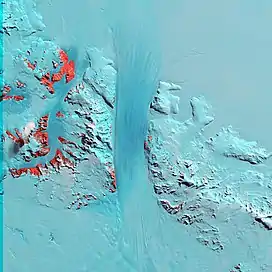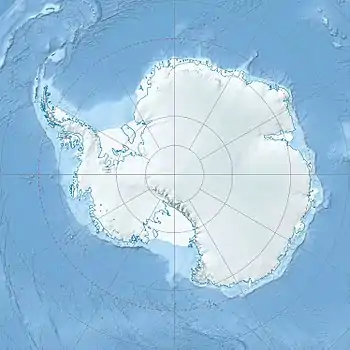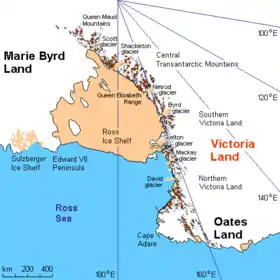Byrd Glacier
The Byrd Glacier is a major glacier in Antarctica, about 136 km (85 mi) long and 24 km (15 mi) wide, draining an extensive area of the polar plateau and flowing eastward between the Britannia Range and Churchill Mountains to discharge into the Ross Ice Shelf at Barne Inlet. Its valley below the glacier used to be recognised as one of the lowest point not to be covered by water on Earth (assuming ice doesn't count as water), reaching 2,780 metres (9,120 feet) below sea level.[1] It was named by the NZ-APC after Rear Admiral Byrd, US Navy Antarctic explorer.
See also: Byrdbreen
| Byrd Glacier | |
|---|---|
 Byrd Glacier from Landsat | |
 Location of Byrd Glacier in Antarctica | |
| Location | Ross Dependency |
| Coordinates | 80°20′S 159°00′E |
| Length | 136 km (85 mi) |
| Width | 24 km (15 mi) |
| Thickness | unknown |
| Terminus | Ross Ice Shelf |
| Status | unknown |
On the south side of Byrd Glacier is Blake Massif.[2]
See also
References
- "About - British Antarctic Survey". www.bas.ac.uk. Archived from the original on 26 September 2015. Retrieved 30 April 2018.
- "Antarctica Detail: Blake Massif". geonames.usgs.gov. United States Geological Survey. Retrieved 12 January 2019.

Area map of Byrd glacier.
| Types | |||||||
|---|---|---|---|---|---|---|---|
| Anatomy | |||||||
| Processes | |||||||
| Measurements | |||||||
| Volcanic relations | |||||||
| Landforms |
| ||||||
| |||||||
This article is issued from Wikipedia. The text is licensed under Creative Commons - Attribution - Sharealike. Additional terms may apply for the media files.